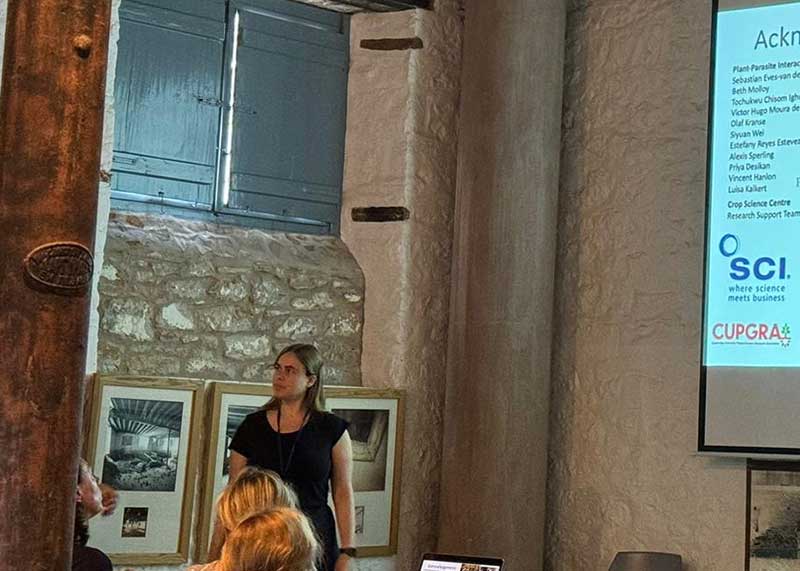The David Miller Travel Bursary Award aims to give early career plant scientists or horticulturists the opportunity of travel in connection with their horticultural careers. Anika Damm was awarded one of the 2024 David Miller Travel Bursaries to attend the "Parasitic Helminths: New Perspectives in Biology and Infection" conference in Greece. Read her report below.
"The David Miller Travel Bursary award generously supported my attendance at the "Parasitic Helminths: New Perspectives in Biology and Infection" conference. This conference takes place annually on the beautiful island of Hydra in Greece and covers all topics around helminth biology and host-parasite interactions. It attracts researchers of plant-parasitic nematodes, as well as those of animal-parasitic nematodes, model nematodes (e.g. C. elegans), and flatworms, connecting scientists that usually don't attend the same conferences. With only 100 attendees allowed, the conference format is highly discussion-oriented and facilitates networking.
"I attended the parasitic helminths conference to explore parallels between my research on plant-parasitic nematodes (devastating pests that infect every major horticultural crop) and animal-parasitic nematodes. Both kinds of pests face similar challenges during parasitism: they need to localise and invade a host, respond to environmental stimuli, and manipulate the host and its immune system. To achieve such manipulation, these pests secrete small molecules (termed excretory/secretory products in animal parasites and effectors in plant parasites) into their host.
"My PhD research centres around the first signalling cascade that regulates effector production in any plant-parasitic nematode: Plant signals induce transcription of the subventral gland regulator1 (sugr1), a nuclear hormone receptor that subsequently orchestrates effector production. Disrupting this signalling cascade inhibits nematode parasitism and could be exploited for nematode control. Presenting this work led to valuable discussions about how these plant signals might be perceived in the nematode, the role of nuclear hormone receptors in nematode parasitism, and potential ligands that might bind to SUGR1. Furthermore, many interesting talks by other conference attendees highlighted fascinating parallels.
Anika presenting at the conference
"A talk by Mostafa Zamanian discussed targets for parasitic nematode control like GPCRs (that sense the environment) or the secretion of effectors. These targets could also be exploited in plant parasites, highlighting the parallel goals of the two fields. Furthermore, striking similarities can be found between plant-parasitic nematodes that need to penetrate plant roots and skin-penetrating parasitic nematodes like Strongyloidesspp. and hookworms. Ruhi Patel presented work about the behaviour of Strongyloides stercoralis during skin penetration and was able to inhibit skin penetration by blocking nematode signalling. Another interesting talk by David Mangelsdorf explored the development of parasitic nematodes after invading a host. The infective stage of parasitic nematodes is developmentally arrested, similar to the dauer stage in C. elegans. Upon contact with the host, these nematodes become activated and resume development, a process controlled by the nuclear hormone receptor DAF-12. It could be interesting to explore potential parallels in plant-parasitic nematodes.
"Overall, I had a wonderful time at the parasitic helminths conference, enjoyed the beautiful scenery of Hydra, and came back with a plethora of new information and ideas. I would like to thank the SCI Horticulture Group for awarding me a David Miller Travel Bursary award and supporting my attendance at this beautiful conference."
Anika Damm
PhD Student
University of Cambridge

